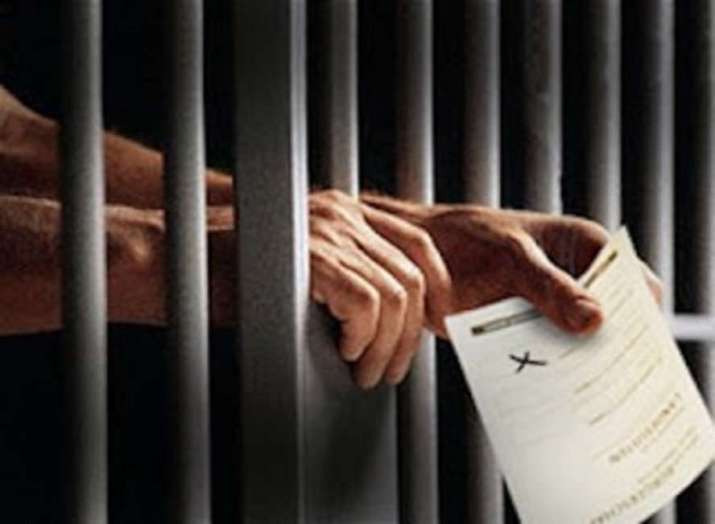FEATURES|COLUMNS|Coastline Meditations
A Buddhist Perspective on Crime, Punishment, and Redemption
 From countable.us
From countable.usThe climate in the US has been heated over the past couple of years, with tensions especially high during the run up to the 2018 midterm elections that took place on 6 November. While many saw this election as a vote on the Trump presidency, Americans were not only deciding whether Democrats or Republicans would hold the House and the Senate, they were also casting their voices on a number of intriguing ballot measures.
One of the most publicized measures was Florida’s Amendment 4, which sought to restore voting rights to former felons, exempting people convicted of murder and felony sex offences. It is reported that approximately 1.5 million people in Florida have committed felonies,* and because they are not restored the right to vote upon serving their sentences, almost one in 10 Floridians is unable to participate in the elections. On 6 November, history was made when more than 60 per cent of voters opted in favor of the amendment.
Opponents to the measure were of the view that people who have committed felonies must demonstrate that they are truly reformed before being granted voting rights. They favored the process that was in place, where former felons were required to obtain a grant of mercy to have their civil rights restored. In practice, this meant people had to wait 5–7 years after serving their sentences before submitting such a request, and often several more years for a hearing due to the backlog of cases. Supporters of the amendment argued that, once a person has served his or her time, the debt is paid, and that a quick reintroduction into society helps lower the risk of reoffending. Desmond Meade, a lawyer and former felon who campaigned for the measure, argued “we [the US] are a nation of second chances.”(CNN)
In the end, a majority of the people of Florida agreed with this view, and opted to vote in favor of the bill that automatically restores the right to vote to felons who have served their time. What does this result tell us about the American view on crime, punishment, and redemption? And what can we Buddhists make of it?
Perhaps the most pertinent story offered to us by the Buddhist texts is that of Angulimala, the thief and murderer turned Brahmin. Indeed, Angulimala spent a number of years terrorizing the realm of King Pasenadi, and infamously wore the fingers of his victims as a necklace. However, the bandit’s life was transformed when Shakyamuni Buddha sought him out and performed a feat of supernatural power; he made it so that the bandit, who was running aggressively towards him, was unable to catch up with him. Eventually, the bandit ended up shouting “Stop!” to the Buddha, to which the Wise One replied “I have stopped, Angulimala. You stop.” (Access To Insight)
After the conversation that followed, the bandit decided to abandon his immoral life and enter the monkhood. The Buddha clearly saw the potential for growth in Angulimala, who eventually went on to attain Nirvana. The story teaches us that despite our wrongdoings, we all have the potential for redemption and enlightenment.
 Angulimala is depicted in Pali Tipitaka as a ruthless killer redeemed by his conversion to Buddhism. From what-buddha-said.net
Angulimala is depicted in Pali Tipitaka as a ruthless killer redeemed by his conversion to Buddhism. From what-buddha-said.netWays of addressing crime and its perpetrators have long been debated, with the ultimate goal of protecting society from harm. Throughout history, people have opted for punishment as the primary deterrent against unwholesome behavior, and unfortunately this view prevails today.
I recently had the opportunity to visit a Los Angeles County jail and was struck by the inhumanity of the premises, which contain inmates awaiting trial for crimes ranging from petty theft, to violent murder. The tour I took was given to members of the public by the jail’s guards, who start off by showing us a row of small, steel enclosures that each contained an inmate. We were told that these “cages”—and this is the exact word used by the guards—are a place for the inmates to have some leisure time and watch TV. We were then shown the inmates’ living quarters. The inmates were separated from us by a glass wall and stared back at us, some with indifference, others with what appeared to be excitement at the break in routine. The similarities to a zoo were unsettling.
On one occasion we even spotted an inmate in the shower, and while the shower is designed in such a way that his midsection was covered, the lack of respect for his privacy and dignity was appalling. We were also informed about “the hole,” where inmates who have disobeyed rules can spend up to 30 days or more in isolation, confined to single room and being fed “a ball of food mashed together” that the guards liken to dog food. While there are a few reformative measures, such as a program that allows “well-behaved” inmates to navigate the building to perform chores, punishment is clearly favored over rehabilitation.
Considering this prevailing approach and the increasingly polarized atmosphere of the US, it is somewhat surprising that so many Floridians voted to give power back to this disenfranchised part of society. And while some have argued that former felons are likely to vote for the Democratic Party—and that therefore the amendment might benefit the Democrats—reports mention that the measure had strong support from both bipartisan and nonpartisan groups and individuals.
Power is not readily shared, and the fact that the majority chose to reinstate a sense of civility and dignity to former felons is certainly to be celebrated. I feel that this result is a wonderful illustration that—no matter what people’s personal political tendencies are—redemption is, to many, a value worth speaking up for and taking action on.
* The word felony is generally used to designate serious crimes, specifically those that are punishable by prison sentences that are greater than one year.
See More
Florida could soon restore voting rights to over 1 million felony offenders (PBS)
Voters will decide on felon voting rights (Florida Politics)
Florida restores voting rights to more than 1 million felons (CNN)
Angulimala Sutta (Access to Insight)
Voters overwhelmingly support felon voting rights amendment (Florida Politics)
Related features from Buddhistdoor Global
Reaching Out to the Incarcerated as a Buddhist Practice: A Tale of Compassion in Arkansas
Venerable Tsunma Lobsang Rinchen Khandro: Acting with Compassion for All Those Suffering from Adversity
“We Have All Made Mistakes” - Teaching Mindfulness in Prisons: A Different Kind of Rehabilitation
Related news from Buddhistdoor Global
Kenya Prison Uses Mindfulness to Reduce Violence and Bridge Gap Between Guards and Inmates
Buddhism the Fastest-growing Religion in Scottish and English Prisons
Buddhist Transitional Community in Pennsylvania Offers Refuge for Former Convicts














